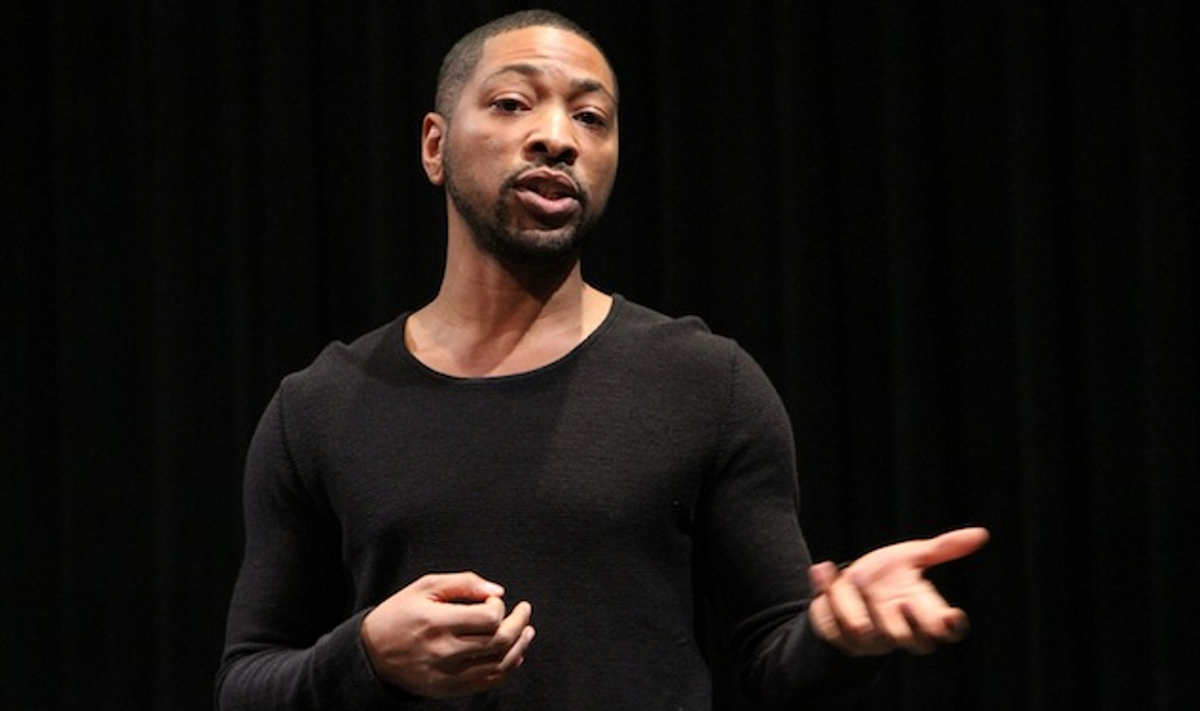
Kyle Abraham’s The Radio Show celebrates the communal space of the airwaves while working through the private anguish of a parent’s illness.
March 17 2014 7:45 PM EST
February 29 2016 2:58 AM EST
By continuing to use our site, you agree to our Private Policy and Terms of Use.

Kyle Abraham’s The Radio Show celebrates the communal space of the airwaves while working through the private anguish of a parent’s illness.
Photography by Julie Lemberger
Out in the suburbs, or in regions with lousy public transportation (like Southern California, where I grew up), the car is practically a second home. And depending on the position of the radio dial, you can find yourself debating politics as you might around a dining room table, or belting Top 40 as if in the shower.
In The Radio Show, choreographer Kyle Abraham celebrates the power and the pulse of that virtual space--alternatively public and private--and mourns the demise of one station in particular, Pittsburgh's Hot 106.7 FM and sister station AM 860 which provided the soundtrack of his youth and which went off the air in 2009.
The hour-long work premiered in New York in 2010 and was revived last weekend at the 92nd Street Y Harkness Dance Festival. The show put Abraham on the map for its seamless fusion of dance styles--from hip-hop to contemporary and classical--and its subtle and sophisticated handling of issues like race and sexuality, all of which are still there.
The four years since have treated the 36-year-old well as he scaled a mountain of buzz, capped off last fall by the kind of accolade that most artists don't even bother dreaming about because it's so elusive: the uber-prestigious, and lucrative, MacArthur award. (And if that wasn't enough, he was honored as one of the Out100 in 2013, too.)
Kyle Abraham (above)
So The Radio Show isn't exactly representative of Abraham's interests right now, or his growth in the past half-decade. But it does showcase the qualities that jazzed people up back then (and still do), as well as reveal some gaps he has yet to fill. For one, as lush and lovely as his movement vocabulary is, it becomes awfully repetitive; all the slack wrists and jutting hips and rolling torsos ultimately do little to illuminate the issues and themes he seems interested in addressing.
Where meaning was most palpable in The Radio Show was, perhaps not surprisingly, in the recognizable characteristics of radio itself: the oft-changing dials and snippets of songs bumping into each other as if they themselves were in traffic (Beyonce was a re-occurring favorite), samplings of both silly and poignant recordings of call-in radio shows, and the inevitable bouts of static.
But there was a more personal layer, too, as Abraham alluded to his father's Alzheimer's diagnosis a decade ago and subsequent aphasia, a type of brain damage that causes speechlessness, which is its own kind of irreversible static. Jeremy "Jae" Neal, one of the production's seven dancers, portrayed a figure representing Abraham's father. (The other fine dancers were Rena Butler, Beatrice Capote, Catherine Ellis Kirk, Connie Shiau, Chalvar Monteiro, and Maleek Washington.)
Neal, in high-waisted slacks and a gray polo shirt with the back cut out (the rest of the cast wore similar outfits), grooved energetically across the stage to an eclectic playlist then suddenly stopped and, with a confused look and shaky hand, began shuffling away. When attempting to speak, he emitted only a hoarse wheeze.
But this sad shadow falling across The Radio Show doesn't manage to deepen it. The illness seems merely referenced, not grappled with and certainly not permitted to infect Abraham's fluid and sexy choreography.
Neal's physical transformation from exuberant to weakened dancer might have spread throughout the entire structure of the work, mirroring the ghosts of a once-vibrant man and a once-vital radio station, allowing us to feel the loss of both a parent and an important communal space. Instead, the music plays on and the dancers dance beautifully so why should we worry what becomes of them?
Sexy MAGA: Viral post saying Republicans 'have two daddies now' gets a rise from the right